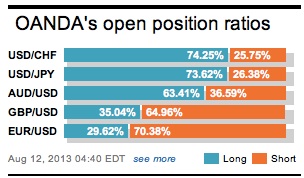Market sentiment has not changed slap-bang in the middle of the European holiday ‘silly’ season. There is noise being made, but the depth of asset class liquidity remains highly questionable. Historically, this is to be expected this time of year – FX price action has been muted and trading thin. Investors seem to be weighing up a solid equity session in China against weakness in Japan, while waiting for a fresh economic catalyst later in the week.
With no major data releases on either side of the Atlantic, this is shaping up to be a rather quiet start to the week. The pace will definitely pick up as the week wears on, however, with German ZEW survey tomorrow and the preliminary estimate of Q2 Euro-zone GDP on Wednesday. Investors will also eye two key Fed speeches this week, as they continue to gauge the timing of any Fed tapering – Atlanta’s Lockhart and St. Louis Fed president Bullard speak Tuesday and Wednesday. So far, Fed speakers are indicating that tapering could start next month, most of them “stress the conditionality of such a decision on the strength of the incoming data.” This would indicate that September is not a done deal – for many December remains their baseline for a pullback.

It’s not just investors who are nervous about Fed tapering, so too are other Central Banks. With most of the developed world falling behind the US in the economic circle, any shift in the Fed’s policy away from accommodation will create problems for other Central Bankers. The possibility that liquidity will be tightened over the coming months has started a “ripple effect” of worry across the global asset classes – Central Bankers are not immune, it is making their job harder.
For many, US treasury yields are the benchmark against which most other global yield-generating assets are measured. Any plans to reduce bond purchases are likely to keep upward pressure on T-bond yields, which in turn will influence other global yields. There is a fine balancing act – yields that aggressively back up are in danger of stifling whatever growth there may be, as credit conditions in other countries too tighten. Both the BoE and ECB have tried to offset this market impact by committing to keeping their rates low – their “forward guidance” message has yet to be truly tested.

Some investors are trying to regain their appetite for risk, mostly thanks to a string of favorable Chinese economic data last week. The world’s second largest economy loans data, released last Friday, showed that Chinese banks extended CN¥699b new loans in July, beating a market estimate of CN¥633b. The Chinese government is reported offering stimulus to important cities and regions to support economic growth. Any state support will give a boost to the Chinese economy and by default renewed investor optimism in the various asset classes.
Last week the BoJ kept both monetary policy and economic assessment unchanged. Regarding inflation expectations, the August statement said that “inflation expectations seems to be increasing as a whole,” compared to the last statement, which said, “some indicators suggest a rise in inflation expectations.” Governor Kuroda has indicated that policy makers are watching a host of economic indicators and that he is quietly optimistic about the outlook. Is monetary easing having a positive impact? Data last night showed that Japan’s GDP was up +0.6%, q/q (sa) in Q2, lower than median forecasts and a revised rise of +0.9% in Q1. GDP rose an annualized +2.6%, q/q (sa) in Q2, lower than median forecasts of +3.6% gain and revised rise of +3.8% in Q1.

So far in the overnight session, the dollar has rallied against the yen as Japanese officials sounded upbeat on the economy, and this despite preliminary April-June GDP data widely missing expectations. Yen has been sold and more sales are anticipated. Failure of USD/JPY ahead of ¥95.59 (overnight low) Fibo improves the short-term outlook. Asia continues to see significant Japanese importer demand for USD/JPY, and outright stop-losses are beginning to gather north of ¥97.20. There continues to be some talk that US names are looking for some more EUR/JPY with light EUR stops clustered around 129.20.

The 17-member single currency seems to be loosing some of that recent luster. Mind you, it’s difficult to tell with such erratic investor outright interest. The German Bundesbank says Greece will need extra aid by early next year – Chancellor Merkel is disputing this, both herself and Schaeuble have insisted that the Greek rescue is on track. The banks report says that the latest tranche was “politically motivated.” Are bailout risks being downplayed ahead of Germany’s Septembers 22nd general election? The latest poll puts Merkel’s coalition and opposition in a ‘dead heat.’ The 30-day upper Bollinger band continues to point north, high lightening the overall upside potential for a break of 1.3482. However, the currency outlook is mixed at current levels (1.3300), due to waning positive daily momentum. Market longs need to be nimble, a close below the 10-DMA (1.3265) warns of a market reversal.

Other Links:
Summer Doldrums Increase German Finance Costs
Dean Popplewell, Director of Currency Analysis and Research @ OANDA MarketPulseFX
This article is for general information purposes only. It is not investment advice or a solution to buy or sell securities. Opinions are the authors; not necessarily that of OANDA Corporation or any of its affiliates, subsidiaries, officers or directors. Leveraged trading is high risk and not suitable for all. You could lose all of your deposited funds.


